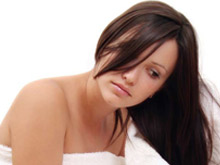Health Topics
-
Healthy Living
-
|
|
January 2010
|
| The Aroma of Hair |
| Dr Raani Rao |
| |
 |
Medical aromatherapy harnesses the therapeutic potential of essential oils to relax, rejuvenate, balance, restore, revitalise and revive the mind, body and spirit. It is a fragrant alchemy and the art of healing the body, by invoking its sense to heal itself through indirect stimulation of the immune system. |
Essential Oils
Essential oils form the base of the discipline of aromatherapy. These oils are plant essences extracted from flowers, trees, fruits, bark, grasses and seeds. Each essential oil has distinctive therapeutic, psychological and physiological properties which either help prevent illness or are curative in nature. There are many essential oils. Oils that are applied to the skin are believed to be absorbed into the bloodstream. The components of the various oils are believed to aid in a variety of health, beauty and hygiene conditions.
An essential oil is a liquid that is generally distilled (most frequently by steam or water) from the leaves, stems, flowers, bark, roots, or other elements of a plant. Essential oils, contrary to the use of the word 'oil,' are not really oily at all. Most essential oils are clear, but some oils such as patchouli, orange and lemongrass are amber or yellow in colour.
Essential oils are antiseptic, antiviral, anti-inflammatory, antidepressant, analgesic and more. They provide a system of healing, which is not only in total bio-chemical harmony with the body but is also non-invasive. They stimulate the immune system, circulatory system and neurological functions.
How Aromatherapy Works
Essential oils work their way into the body either through the nose (olfactory membranes) or through the skin. Each fragrance molecule attaches itself to specific receptor cells at the nerve endings. The molecules absorbed, generate electrical impulses that are transmitted to the limbic system of the brain. The limbic system is directly connected to areas in the brain that control vital life signs like heart rate, breathing, blood pressure, memory, stress levels, hormone balance etc. This enables these impulses to be transmitted to the various parts of the body depending on their type and function. This results in profound physiological and psychological effects like mental and physical relaxation. The methods of application of essential oils vary with the kind of ailment, other medicinal intake and the response rate of the patient. Massage, inhalation and ingestion are the modes of application.
Hair Care
Healthy hair requires essential nutrients on a daily basis. Keep in mind that unhealthy hair is caused by many factors: heat (irons, blow drying, curlers etc), UV rays (sun, tanning beds etc), mechanical devices (combs, brushes etc), chemicals (hair colour, perms, relaxers, pool chemicals etc), or poor diet.
Use natural hair care products and sulphatefree products. Before purchasing any hair product read the ingredients first. Identify those that are harmful and avoid using them. Unfortunately, most commercial products contain substances that cause more harm than good. The continued use of such products will eventually weaken your hair to the point where it will break easily and fall out. If you colour your hair, you might want to consider a natural dye or no-ammonia hair colour.
Essential oils, unlike drugs, are not harmful to the body. Aromatherapists, along with trichologists (those who help with the hair and scalp), have researched essential oils for their ability to stimulate hair growth in atrophied hair follicles. Hereditary factors do bear a part in the balding pattern but, reducing the ageing factor in the whole body by keeping the cell function healthy and vigorous, can delay the balding process.
Hair Management
When towel drying your hair, don't rub it vigorously – blot it instead. This extra care is required as the hair tends to break easily when wet. Never brush your hair when wet. Always use a wide tooth comb to avoid pulling the hair out. If you use a hair dryer, use "thermal protector" to protect against heat. Protect your hair against sun's rays by using a conditioner with U.V. protectors built in. Exercising improves your body's circulation, which in turn improves hair. So work out for healthier hair.
Foods
Foods rich in Essential Fatty Acids help improve the texture of dry and brittle hair. Foods high in B vitamins help hair health and growth; those high in Vitamin C improve circulation to the scalp. Vitamin E foods increase oxygen uptake and improve circulation, thereby improving hair health and growth. Zinc stimulates hair growth by improving immunity. Carbohydrate and sugar destroy B vitamins and decrease minerals, leading to unhealthy hair. Consult with a qualified dietician to discuss a specific regimen that best fits your needs. |
|
 |
Dr Raani Rao is an Aromatherapist at Apollo Wellnessplus, Chennai |
|
|